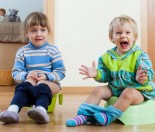Parents are often concerned about whether their young child is developing within a normal range. All children develop at different rates, and most are faster in some areas while lagging behind in others. The table below is a quick guide to the ages that many children typically meet significant milestones. Each child is unique and you needn’t be too concerned if they haven’t meet all the milestones listed on time.
12 -18 months
Physical
- Moves from sitting to standing and back again
- Walks but falls often
- Crawls up and down stairs
- Holds and releases a ball
- Picks up small objects with thumb and index finger
- Builds a tower with 2-3 blocks
- Drinks from a cup
- Feeds themself with fingers and attempts with a spoon
- Scribbles with crayons/ pen
Social
- Self centred
- Initiates games such as peekaboo
- Will respond to the emotions of those around them, eg laugh if others laugh.
- Interested in their reflection in the mirror
- Shows pleasure when they see a loved one
Emotional
- Experiences a wide range of emotions – particularly frustration, happiness, sadness, anger
- Emotions can change very rapidly
- May get very upset when separated from primary caregiver
- Responds with frustration when they can’t do something
Mental and language
- Uses 10-40 words although has difficulty with pronunciation. Will babble as though holding a conversation.
- Understands around 200 words
- Can point to several body parts
- Understand simple directions eg “go get the ball”
- Enjoys cause and effect games
- Will want to repeat the same games and activities over and over again
Talk your child’s doctor or plunket nurse if your child is over 18 months and doesn’t:
- Babble very much
- Respond to their name
- Show a preference for particular people
- Use at least 3 words with meaning, eg Mama, Dada, ball
- Don’t be concerned if your child chooses not to crawl. This is much more common now, as babies are placed on their backs to sleep and so do not spend as much time on their tummies. Many people believe skipping crawling can affect their learning later on, as babies use hand eye and lateral coordination to crawl. As long as your child learns to crawl at some stage, it doesn’t matter if they walk first.
18 months – 2 years
Physical
- Walks steadily and runs
- Walks backwards
- Climbs onto low objects
- Kicks a ball
- Squats to pick up an object without using their hands on the ground
- Can build a tower of 6 or more blocks
Social
- Becoming aware of themselves as a separate person
- Starting to interact more with other children, but will observe, copy or play alongside rather than with others
- May offer other children a toy or a hug without realising whether they are welcome
Emotional
- May begin to have temper tantrums or meltdowns
- Separation anxiety may fade
- Still finds frustration difficult to deal with
Mental and language
- Uses up to 100 words, although still has unique pronunciation
- Begins to use 2-3 word phrases
- Begins to engage in imaginary or fantasy play eg feeding a doll
- May start testing the rules
- Can find objects that are hidden
- Concentration time improves
Talk your child’s doctor or Plunket nurse if your child is over 2 and doesn’t:
- Walk steadily, particularly if they walk with a limp
- Use at least 10 words with meaning
2 – 3 years
Physical
- Balances on one foot
- Walks up stairs using one foot on each step
- Can roll, crawl, creep, jump, climb and run, but will still fall often when running or jumping
- Throws a ball, and will extend hands to catch it
- Starts to dress and undress themselves
- Gaining control of their bowel and bladder
- May be able to pedal a tricycle
- Scribbling become more controlled and patterns may be repeated
Social
- Generally plays alongside other children still, although may play with others in certain games eg chasing
- Shows awareness of others’ feelings
- Finds sharing or waiting for a turn difficult
- Imitates others
Emotional
- Improves ability to calm themselves
- Starting to see themselves as a separate person and trying to be more independent
- Gets excited when they see their friends
Mental and language
- Uses around 500 words and possibly up to 1000
- Uses 3 or more word sentences eg “Mummy go now”
- Asks questions, particularly “why” questions
- Language will be more understandable to strangers
- Understands directions with 2 parts, eg “tidy up your toys then we can go out”
- Able to sort similar objects into groups
- More advanced imaginary play, although may find it difficult to separate what is real from what is not.
Talk your child’s doctor or plunket nurse if your child is over 3 and doesn’t:
- Stand briefly on one foot and jump with two feet
- Give their full name when asked
- Interact with others very much
- Feed themselves with a spoon
- Speak clearly enough for their primary caregiver to understand most of the time
3 – 4 years
Physical
- Throws a ball in the right direction, although catching may still be difficult
- Walks along a plank
- Can stand, walk and run on tiptoes
- Balances on one foot for several seconds
- Buttons their clothes
- Shows a preference for their right or left hand
- Holds a pencil with the correct grip
- Uses scissors
- Uses the toilet, although still may have occasional accidents
Social
- Plays with others, usually cooperatively
- Understands others have different feelings to them
- Tries to solve problems with friends or family
Emotional
- Able to regulate their emotions better, eg can calm themselves or wait for dinner for a short time when they are hungry
- May get upset with major changes in routine
Mental and language
- Can get their message across most of the time
- Uses at least 1200 words
- Understands location words eg under, beside
- Uses complex sentences
- Starts forming letters and drawing objects
- Understands concept of time
Talk your child’s doctor or plunket nurse if your child is over 4 and doesn’t:
- Show any interest in using the toilet
- Speak clearly enough for a stranger to understand most of the time
- Follow directions with 2 or more parts
- Does not interact with other children in play
4 – 5 years
Physical
- Hops, walks along a line or a beam for a short distance
- Dresses and toilets themselves
- Climbs ladders and trees
- Jumps over objects
- Brushes own teeth
- Draws shapes such as triangles accurately
Social
- Engages in cooperative play with other children
- Wants to be like their friends
- Understands gender
- Enjoys dramatic, physical or imaginative play with friends
- Friendships change rapidly
Emotional
- Experiences a wide range of emotions.
- Emotions are often extreme
- Shows concern and sympathy for others
Mental and language
- Uses sentences that are grammatically correct
- Knows some colours and letters
- Can count up to 10 objects correctly
- Able to lie – unfortunately!
Check out our page on school readiness to see what your child should be able to do before starting school.
Parents of babies, toddlers and preschoolers often feel the pressure of whether their child is developing at the same rate – or preferably faster – than their peers. It’s important to remember that all children develop at different rates and that starting earlier is not necessarily a sign of genius in that area, just as starting later does not necessarily mean your child will always be behind.
Look out for the signs of possible developmental delay, but if you don’t see these, just relax and enjoy the child who is still sitting at 14 months. You will have many friends who will be incredibly jealous you don’t have to run around childproofing everything yet!
Websites to explore further:
http://www.whattoexpect.com/toddler/month-by-month.aspx
http://www.plunket.org.nz/your-child/1-2-years/development/
http://www.plunket.org.nz/your-child/2-5-years/development/
http://www.jigsaw.org.nz/Site/Help/Development/ages_and_stages.aspx






